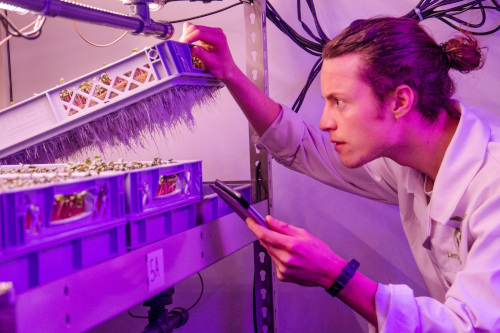Vertical farming has been boosted in the UK by a series of significant investments and expansions of farms in Bristol and Lincolnshire.
LettUs Grow, a vertical farm start-up created by engineering students at the University of Bristol, has just secured £2.35 million in funding that they said would “accelerate” development in 2020.
The company creates the modules and technology as vertical farm ‘kits’ that it says can be delivered to farmers across the country.
LettUs Grow’s system is based on aeroponics, where plants are ‘misted’ to deliver nutrients, and grown without using any pesticides. The company says it uses 95 per cent less water than other systems.

It comes as the company behind the UK’s largest vertical farm, Jones Food Company (JFC), which attracted funding from Ocado last year, said it has plans to scale up rapidly, according to the Times. At the moment, it runs a vertical farm in Lincolnshire that can produce over 400 tonnes of baby leaf salad a year.
The JFC vertical farm is run hydroponically, with plants grown on a rock-based mineral fibre known as rockwool, and fed nutrients via water.
Both aeroponic and hydroponic vertical farm systems grow plants without natural light, using specific LED light formulas, and use a fraction of the land and water used in traditional farming.
Vertical farms in both Scotland and London are also planning major expansions, trade magazine Fresh Produce Journal has reported, while a proposed rooftop urban farm in Paris made headlines last year as the largest of its kind in Europe.
It comes amid debate about what future of farming will look like, in context of the climate crisis, and the need for better environmental protection.
High-profile commentators, including journalist George Monbiot, and former chief scientist to Defra, Sir Ian Boyd, have both endorsed ‘alternative’ farming systems as potential solutions in recent weeks.
Monbiot has endorsed lab-grown protein and food grown from bacteria and predicted the end of farming as it is today as part of his provocative Channel 4 film, Apocalypse Cow – a view he reiterated at last week’s Oxford Real Farming Conference.
Boyd told the Guardian recently that half of all British farmland should be rewilded to combat the climate crisis, and the resulting loss in food production could be made up with technology like vertical farms.
Speaking on a panel alongside Monbiot, chair of the Sustainable Food Trust, Patrick Holden, refuted the need for alternative farming systems, instead calling for food to be produced in harmony with nature and without “diminishing natural capital”.















I work in horticulture so I have an interest in developments like this. I think investment by venture capitalists need to be looked at as a lot of this is driven by the thought that this could be the next big thing to make money at millions of speculative money is being put into this technology. Cannabis growing is another thing attracting massive investment. There is a 75 acre glasshouse complex being built in my area funded initially by venture capital. But I do question whether this sort of capital investment is the way to go as the people doing it are just looking for future profits and not necessarily the direction we should be going. By their nature these will be heavy users of energy and we can’t live off lettuce leaves. I do wonder where we are going
Considering that various methods using unusual systems for food production have been around for many years (hydroponics, aquaponics and others) it does seem strange that suddenly these systems are being muted regularly now. Perhaps Barbara Dibley above has “hit the nail on the head” with this – people throwing huge amounts of money into the production of large scale “salad growers” with a view to making money rather than actually do it for the purpose of increasing production of much needed items that will better feed mankind (and other animals) in the future when choices of venue for that production are reduced in some way. In some ways I think it will be sometime before this present “fad” shows it’s true colours, still there is the thought that if it is a fad after the initial efforts hopefully these “factories” may yet be taken over and used for better production – what a nice thought
The Walrus